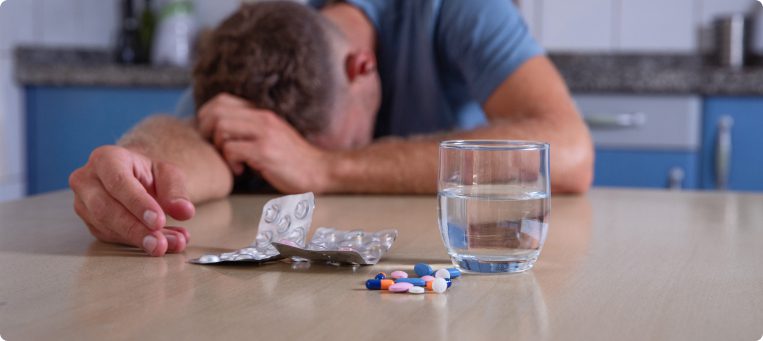Oxycodone is a semi-synthetic opioid medication prescribed for treating moderate to severe pain. Also known as oxy, this drug is administered orally and marketed under brand names as OxyContin, Roxybond, Roxicodone, and Oxyado. It is available both as an immediate or extended-release tablet or capsule and as an extended-release solution. Like other opioids, oxycodone activates opioid receptors and inhibits the transmission of pain signals providing pain relief.
Oxycodone abuse occurs when the drug is used without a prescription to relieve pain or for its euphoric effects. It remains one of the most significant contributors to the opioid crisis in Canada. Oxycodone addiction can develop quickly as users misuse the drug to achieve the associated “high.” It’s crucial to seek professional help immediately if you can’t stop using opioids or notice a pattern of opioid abuse in a loved one. The Canadian Centre for Addiction offers oxycodone addiction treatment and rehab in Ontario.
Getting Help for Oxycodone Addiction

You can get oxycodone addiction treatment for yourself or a loved one at the Canadian Centre for Addictions. At CCFA, we offer the most sophisticated oxycodone drug rehab in an environment that inspires lasting change. We also help people understand their addictions and the healthier coping strategies available to them by engaging them in one-on-one counselling with certified counsellors, psychiatrists, and mental health professionals. Call 1-855-499-9446 to learn more about our treatment programs.
How We Treat Oxycodone Addiction and What to Expect
At CCFA, we offer a client-focused approach to treating oxycodone abuse and addiction. We provide treatment strategies designed to meet the unique symptoms of the client. Our visitors can expect a full range of services that provide flexible therapy and counselling for addiction. We also know that addiction can negatively impact every aspect of your life, so our specialists will assess you to provide individualized, client-oriented treatment.
Our oxycodone drug rehab centre offers inpatient rehab, outpatient treatment, individual and group counselling, intervention counselling, and lifetime aftercare, all designed to give you the best chance at recovery.
When to Seek Help for Oxycodone Addiction
OxyContin abuse and addiction often start when a patient with a prescription uses the drug in ways other than prescribed. Having a prescription can make it difficult to detect when a loved one is abusing or addicted to the drug. Opioid drugs may also have side effects even when used as prescribed. Seeing any of the following signs in an oxycodone user suggests they may need professional drug addiction intervention:
- Going for frequent prescription refills
- Borrowing or stealing another person’s prescription
- Trying and failing to stop using oxycodone
- Intensely craving oxycodone
- Spending a significant amount of time obtaining, using, and recovering from the effects of oxycodone
- Continued oxycodone use despite adverse effects on one’s relationships, health, or finances
- Decreased productivity at home, school, or work due to oxycodone use
- The buildup of oxycodone tolerance – needing higher amounts of the drug to achieve the same effects
- Becoming oxycodone-dependent; unable to go about normal activities without the drug
- Exhibiting withdrawal symptoms when you try to stop or reduce oxycodone use.
Why Should You Choose the Canadian Centre for Addictions?
Addiction is a complex disease requiring professional care to overcome. The stigma associated with addiction also makes it challenging to speak up or determine the right place to seek help. It also disrupts your life and disconnects you from the things that matter. At CCFA, we offer a patient-centric approach that keeps you connected to your life and responsibilities outside so your transition to regular life is as smooth as possible.

We take our work seriously because we understand that our clients are at a vulnerable point in their life. We are open, honest, and communicative about what we deliver and take the first step towards building the trust needed to form strong bonds with those who need our help.
We also understand that addiction affects the individual and others close to them. So, our therapists and staff extend their care to helping families cope with addiction while treating their loved ones. We not only help people overcome their addictions, but we also help them navigate the hurdles that addiction creates for those who care about them.
Treatment at CCFA doesn’t end but evolves when you leave. We offer a place where people can return to if things get challenging. Our combination of quality inpatient care and the sense of community from our aftercare services provide a balance you can rely on year after year.
The Canadian Centre for Addictions Success Stories
At CCFA, we have recorded tremendous success in treating people addicted to opioids and other substances. Here are testimonials from some of our satisfied clients:
“The highly competent staff is able to provide emotional and physical support as well as effective addiction therapy. With an open mind, I found I was able to draw healing from each of the well-balanced and skillfully presented meetings and activities. During my stay at CCFA, I learned how to regain control of my life. I left with skills I require to keep moving forward in my recovery. The facility is spacious, comfortable and clean, and the community is exceptional. The fitness and activities, as well as the delicious meals, are outstanding. By far, this was the most productive 30 days of my life. A gift from me to me!”
Elliot Hester
“I came in with a broken soul, full of self-pity, not liking who I was, full of fear and low self-esteem. During my stay, I learned so many valuable lifelong lessons. The counsellors challenged me to feel again; to think and understand those feelings, to express my feelings and thoughts. They have taught me the strategies and tools that I must apply to my new life going forward. For the first time in my life, I feel calm, relaxed, strong with the new me, and most importantly, HAPPY. Thank You.”
Edmund Rudd
“My involvement with CCFA has been an absolute lifesaver for me. The entire program and one-on-one sessions have given me the look and strategies to leave with and have a clean and sober life going forward. A very warm, welcoming, home-like environment.”
Martha Esquivel
“The CCFA has showed me a new way of life. The counsellors here are amazing, love working with all of them. I had a great stay and can’t wait to continue my road to recovery with the tools I have learned. Thank you.”
Kiaan Ochoa
Types of Treatment for Oxycodone Addiction

CCFA offers multiple treatment options for addiction to OxyContin. Our treatment programs are tailored to the individual’s specific needs and include the following:
Detox
Detox is a medical process that helps to eliminate every trace of an addictive substance from the client’s system. Oxycodone, like other opioids, has unpleasant and possibly dangerous withdrawal symptoms. Our detox program allows you to rid your body of the drug in a safe, controlled environment under professional supervision.
Inpatient Rehab
People with severe oxycodone addiction or those who overdose on the drug may require residential oxycodone rehab. Inpatient rehab is an intensive treatment for severe addiction cases. CCFA provides a sober and secure environment for clients to recover from addiction. Our specialists utilize patient-oriented protocols to set our clients on the path to wellness. We combine medical treatment with relevant treatment options to give our clients a holistic approach to recovery.
Outpatient Treatment
In outpatient treatment, the individual lives at home but attends scheduled appointments and meetings. Outpatient treatment is ideal for clients with manageable oxycodone addiction and sufficient motivation to quit. It often requires a reliable support network of friends and family to encourage and help the patient stay on the path to full recovery.
Counselling
Lasting addiction treatment depends on finding and modifying the root cause of the addiction. Our addiction counselling programs involve individual or group sessions that help participants identify and change these thought patterns and behaviours. They also help spot and resolve past trauma that may promote addictive behaviour. CCFA’s counselling and intervention programs help addicts develop positive attitudes and skills, which they’ll use as they begin their journey to sobriety.
Aftercare
Addiction recovery does not end with treatment. Recovering addicts require continuous aftercare services to prevent relapse when they face challenges. Our relapse prevention programs equip patients with the tools and coping mechanisms to remain sober when they inevitably encounter triggers. An aftercare treatment plan depends on an individual’s situation and may include outpatient treatment, counselling, and 12-step programs.
What to Expect in Oxycodone Addiction Treatment
When you visit our oxycodone rehab centres, you can expect treatment in a facility equipped to help you recover from addiction. The first thing we’ll do when you come in for treatment is to evaluate and understand your situation so that we can design a specialized recovery plan. We will assess your medical history to determine whether you’re using other drugs besides oxycodone.
We will screen you for co-occurring mental health disorders and perform tests to determine the presence of drugs in your system. We will start your treatment with detox to rid your body of every addictive substance. If your situation is severe or complicated, you will be admitted to our facility so our staff can safely monitor and manage your withdrawal symptoms. Otherwise, you’ll be allowed to go home and return for scheduled appointments.
We offer individual and group counselling sessions to help clients identify and change thought patterns that may fuel substance use and addiction. Our holistic treatment programs incorporate activities like meditation, mindfulness, and yoga to help our clients stay grounded. You may also be encouraged to join a support group where you connect and interact with others at different stages of recovery.
Your treatment does not end when you leave our rehab centre. At CCFA, we provide aftercare and relapse prevention services as part of our treatment program. We teach our clients to identify their triggers and design strategies to avoid or get through them. We also offer bi-weekly in-person aftercare visits and teleconferencing options to ensure long-term recovery.
Oxycodone Addiction Treatment Stages
Our Oxycodone treatment stages are:
- Detox
- Inpatient/Outpatient treatment
- Counselling/therapy
- Aftercare
Understanding Oxycodone Addiction
Oxycodone addiction is a disorder in which an individual cannot stop using opioid drugs despite obvious harmful physical or psychological health impacts. A person addicted to oxycodone will feel a compulsive need to use the drug, usually for its euphoric effects.

Like other opioids, oxycodone is habit-forming as it activates the brain’s reward centres. It floods the brain with endorphins – feel-good chemicals that diminish pain perception, produce pleasurable sensations, and leave the user with an overall feeling of well-being. Oxycodone tablets are meant to be swallowed whole, but abusers may chew the tablets or crush them and snort the powder. They may also dissolve the crushed pills in water to get a faster high.
However, these feelings wear off when a dose has run its course, leaving the user craving them again. If they continue using this drug to feel good, they’ll quickly develop tolerance, needing increased doses for the same effect.
Doctors usually refuse to increase a patient’s opioid dose or give them another prescription if they build tolerance. Users who believe they need to keep getting those euphoric feelings may turn to the streets or illegal sources for their fix. Illegally obtained drugs may contain contaminants that increase the risk of injury or overdose death. Street oxycodone is usually expensive, and people who cannot afford the costs may turn to heroin which has similar effects.
Continued abuse of OxyContin, or oxycodone in general, will lead to dependence – a situation where the individual cannot function normally without the drug – and full-blown addiction. They will also experience unpleasant withdrawal symptoms if they try to stop or reduce their drug use.
Withdrawal Symptoms of Oxycodone
Individuals who try to quit using oxycodone or are cut off from their regular supply will typically manifest unpleasant withdrawal symptoms. These symptoms may be mild to severe depending on the length and severity of the addiction and other factors like medical history or health condition. Oxycodone addiction withdrawal symptoms include:
- Nausea
- Anxiety
- Runny nose
- Cold sweats
- Intense cravings
- Insomnia
- Diarrhea
- Loss of appetite
- Muscle spasms
- Restlessness
- Rapid breathing
Oxycodone Addiction Symptoms
Like other opioids, oxycodone addiction symptoms could be physical, psychological, or behavioural.

Physical symptoms of oxycodone addiction include:
- Drowsiness
- Slurred speech
- Impaired coordination
- Sleep disturbances
- Constricted pupils
- Headaches
- Disorientation
- Diminished impulse control
Psychological symptoms of oxycodone addiction include:
- Anxiety
- Paranoia
- Extreme mood swings
- Difficulty concentrating
- Memory problems
- Anger and irritability
Behavioural symptoms of oxycodone addiction include:
- Borrowing, stealing, or forging prescriptions
- Using the drug in risky circumstances like driving
- Doctor shopping
- Social isolation
What are the Causes of Oxycodone Addiction
Addiction has no single cause, and using oxycodone as prescribed is unlikely to lead to addiction. An individual’s risk of abusing and becoming addicted to oxycodone may be affected by the following factors:
Family History and Genetics
There is a relationship between genes and addiction. About 40% to 60% of a person’s risk of becoming addicted to opioids may be linked to their genes. Individuals with a parent or sibling who has struggled with a similar addiction may also be at higher risk. Other heritable traits like impulsiveness and novelty-seeking may also increase a person’s risk of abusing drugs like oxycodone.
Self-Medication/Over Prescription
Using oxycodone to treat pain without a prescription increases its abuse and addiction risk. People with severe or chronic pain who are overprescribed or use high doses of opioid medication also carry a higher addiction risk.
Environmental and Social Pressure
Early exposure to substances can increase drug abuse and addiction risk. Using gateway drugs like alcohol and cannabis can also open a person up to oxycodone and other opioid abuse.
Long-term Effects of Oxycodone Addiction
Continued abuse and addiction to oxycodone can lead to severe long-term effects, including:
- Liver damage
- Kidney failure
- Cardiac arrhythmias
- Cognitive impairment
- Hyperalgesia (increased sensitivity to pain)
- Onset or worsening of co-existing mental health disorders
- Suicidal ideation
- Increased risk of overdose and death
Frequently asked questions
Oxycodone can cause irregular emotions that are difficult to handle and interfere with one’s relationships. A person on oxycodone will experience mood swings that may see them calm and relaxed one moment and then angry or agitated the next.
The negative side effects of oxycodone abuse or addiction include:
– Drowsiness
– Slurred speech
– Impaired coordination
– Sleep disturbances
– Constricted pupils
– Anxiety
– Paranoia
– Extreme mood swings
– Difficulty concentrating
– Memory problems
Yes. Oxycodone acts on the brain’s reward centres eliciting euphoric effects and blocking the perception of pain. Oxycodone and other opioid use can be habit-forming, leading to physical or psychological dependence.
You should only take oxycodone as prescribed by a doctor. The dosage for OxyContin treatment is different for every patient, but standard tablets containing 5mg, 10mg, or 20mg of oxycodone are usually taken four to six times daily.
Yes. Oxycodone increases the amount of dopamine in the brain, which signals brain neurons to numb pain and produce the associated euphoria. Substance abuse carries a high risk of addiction due to the actions of dopamine and other neurotransmitters.
Five long-term effects of opioid addiction are:
– Liver damage
– Kidney failure
– Cardiac arrhythmias
– Cognitive impairment
– Increased risk of overdose and death
OxyContin is a brand name for oxycodone. It is a controlled-release oxycodone brand, meaning that the pain-relief effects are released over several hours instead of at once. Other oxycodone brands include Roxybond, Roxicodone, and Oxyado.
Yes. Oxycodone is a powerful opioid that can make you fall asleep. The drug binds to specific brain receptors leading to pain relief, euphoria, and sedation.

